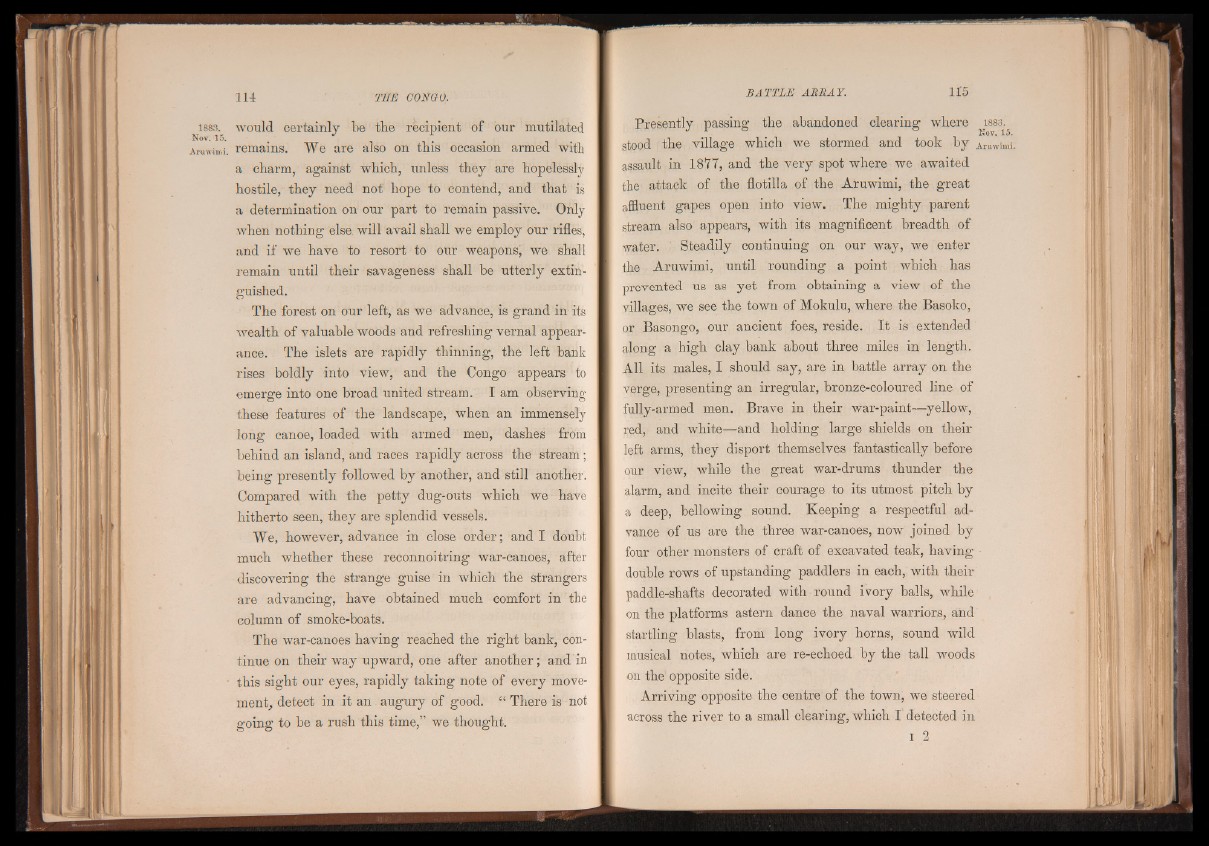
would certainly be the récipient of our mutilated
remains. We are also on this occasion armed with
a charm, against which, unless they are hopelessly
hostile, they need not hope to contend, and that is
a determination on our part to remain passive. Only
when nothing else, will avail shall we employ our rifles,
and if we have to resort to our weapons, we shall
remain until their savageness shall be utterly extinguished.
The forest on our left, as we advance, is grand in its
wealth of valuable woods and refreshing vernal appearance.
The islets are rapidly thinning, the left hank
rises boldly into view, and the Congo appears to
emerge into one broad united stream. I am observing
these features of the landscape, when an immensely
long canoe, loaded with armed men, dashes from
behind an island, and races rapidly across the stream ;
being presently followed by another, and still another.
Compared with the petty dug-outs which we have
hitherto seen, they are splendid vessels.
We, however, advance in close order ; and I doubt
much whether these reconnoitring war-canoes, after
discovering the strange guise in which the strangers
are advancing, have obtained much comfort in the
column of smoke-boats.
The war-canoes having reached the right bank, continue
on their way upward, one after another; and in
this sight our eyes, rapidly taking note of every movement,
detect in it an augury of good. “ There is not
going to be a rush this time,” we thought.
Presently passing the abandoned clearing where
stood the village which we stormed and took by Aruwimi
assault in 1877, and tbe very spot where we awaited
the attack of the flotilla of the Aruwimi, the great
affluent gapes open into view. The mighty parent
stream also appears, with its magnificent breadth of
water. Steadily continuing on our way, we enter
the Aruwimi, until rounding a point which has
prevented us as yet from obtaining a view of the
villages, we see the town of Mokulu, where the Basoko,
or Basongo, our ancient foes, reside. I t is extended
along a high clay bank about three miles in length.
All its males, I should say, are in battle array on the
verge, presenting an irregular, bronze-coloured line of
fully-armed men. Brave in their war-paint—yellow,
red, and white—and holding large shields on their
left arms, they disport themselves fantastically before
our view, while the great war-drums thunder the
alarm, and incite their courage to its utmost pitch by
a deep, bellowing sound. Keeping a respectful advance
of us are the three war-canoes, now joined by
four other monsters of craft of excavated teak, having •
double rows of upstanding paddlers in each, with their
paddle-shafts decorated with round ivory balls, while
on the platforms astern dance the naval warriors, and
startling blasts, from long ivory horns, sound wild
musical notes, which are re-echoed by the tall woods
on the opposite side.
Arriving opposite the centre of the town, we steered
across the river to a small clearing, which I detected in
I 2